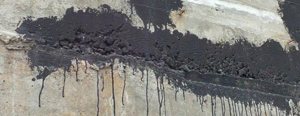Category
- Concrete Best Practices

As there are many ways to waterproof a structure, depending on the unique situation, there are just a few basic guidelines of how NOT to waterproof that can apply to any concrete waterproofing situation.
1) Inadequate research
Waterproofing concrete has been an evolving industry, and many techniques have been vastly improved upon compared to years past. Using the same practices over and over, without exploring newer technologies, may be doing a disservice to the integrity of your project.
Best Practice: Using the best product for the structures use, as it is meant to be used.
2) Letting cost be the final deciding factor in which product is used
Sometimes the cheapest option actually ends up being more costly as the application may be difficult or time-consuming. The preparation of the area, and waiting for ideal conditions can also delay many options, and effectively drive up the actual cost
Best Practice: What you are ultimately going to determine is the overall value that each of your choices would give you. Naturally, you should choose the option that gives you the best and greatest value. And it is not necessarily the one with the lowest price.
3) Focusing on the short-term solution, rather than the long-term
A buildings daily usage, seasonal weather conditions, and future development should all be taken into account when waterproofing a structure. What some people fail to recognize, is that a structure with low traffic at the time of the build may have double the traffic, therefore double the stress, as little as five years down the road. Taking development trends into account will save on costly future repairs and reinforcements.
Future accessibility to areas where repairs may be needed after the building is finished is also important. If access is not possible, a permanent waterproofing solution is critical.
Best Practice: A long-lasting waterproofing solution will save costs down the road, and for a contractor, actually drive business. If a customer experiences a leak free building for years, they will tell their friends who DO have leaks, who to call for peace of mind.



